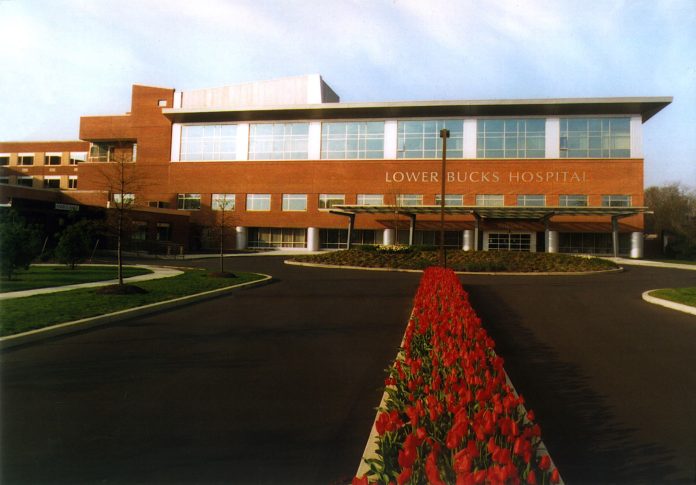Over the recent holiday weekend, about 230 nurses at Bristol’s Lower Bucks Hospital and Norristown’s Suburban Community Hospital went on strike.
The walkout, which commenced at 7 a.m. on Friday at both facilities, came nearly two months after the nurses’ contracts with owner Prime Healthcare lapsed, and six weeks after the nurses staged dual informational pickets to protest what they describe as dangerous staffing conditions and inadequate health insurance, which they said is resulting in difficult recruitment and retention.
On Dec. 11, the nurses voted by overwhelming majorities to authorize their bargaining committees to call strikes, and submitted dual 10-day notices to Prime.
“Healthcare professionals enter the field because we care,” said Maureen May, RN, president of the Pennsylvania Association of Staff Nurses and Allied Professionals, representing the nurses at both hospitals. “We are the primary advocates for our patients, and we don’t walk away from that role lightly. But we will send a message, via a strike, that you have to do the right thing by your patients and your staff. This is our message, to the hospital, to the public, that we’ve had enough.”
Critical quality-of-care issues, such as the need for safe staffing, recruitment and retention of nurses, and resources for caregivers and patients, are at the core of their negotiations. In California, where Prime is based, there are legally-mandated nurse-to-patient ratios. However, that’s not something required in Pennsylvania at this time. Legislation sponsored by Rep. KC Tomlinson — the Patient Safety Act (House Bill 106), which would establish safe patient limits under the care of an individual nurse in PA hospitals — passed the House in June and moved to the Senate.
“Nurses across the state are being assigned to an increasing number of patients, sometimes 10 to 12 at one time,” Tomlinson said. “It’s very simple. The more patients a nurse must care for creates greater opportunities for errors, errors that could cost patients their lives. By alleviating the burden on individual caregivers, we would be allowing them to maintain their wellbeing, job satisfaction and overall performance.”
Picketing occurred daily at Lower Bucks and Suburban Community hospitals on Friday, Saturday and Sunday. There was no picketing on Christmas Day, and picketing was limited to Suburban on Tuesday. During the strikes, the nurses held a holiday toy and coat drive for Bucks County Toys for Tots, the New Falls Road Red Cross Homeless Shelter and the Laurel House for Domestic Abuse.
“I’ve been an ICU nurse at Lower Bucks Hospital for 32 years,” said Shirley Crowell, RN, co-president of the Nurses Association of Lower Bucks Hospital. “As our hospital cuts staff, nurses pick up the slack. We act as transporters, secretaries, schedulers, aides, janitorial workers, maintenance crews, phlebotomists, respiratory therapists, educators — the list goes on. We do this for the good of our patients, even as the number of patients assigned to each of us increases at management’s behest. It’s exhausting and it’s unsustainable. RN vacancy rates have soared. We deserve better, but most importantly, our patients and the community deserve better.”
According to PASNAP, studies show that, for every patient added over four per nurse, the risk of a surgical patient dying increases by 7 percent.
“This is why we are willing to strike,” said Crowell. “It’s for our patients. It’s always for our patients.”
Lower Bucks Hospital remained open during the strike and was staffed with qualified, temporary resources throughout the nursing and non-nursing departments.
Prime said in an official statement to The Times, “Prime Healthcare continues to bargain in good faith with Pennsylvania Association of Staff Nurses & Allied Professionals union leadership with the goal of reaching an agreement in the best interests of the hospital, its employees and, most importantly, those who we serve.
“Proposals have been delivered to the union that would increase wages and provide a valuable healthcare plan, maintain important benefits and be competitive with other hospitals in the market. It is disappointing that, despite progress being made, the union has walked away from negotiations and has chosen to strike. But that will not impact our commitment to providing quality patient care to our communities throughout the holidays and always.”
According to Prime, services and compliance with regulatory standards were maintained throughout the strike, and communication was upheld with providers and partners about contingency plans.
“We value all of our employees and their dedication to caring for our community, and we are committed to ensuring a workplace that honors their work and continues to provide lifesaving care for the most vulnerable,” Prime concluded.
Samantha Bambino can be reached at [email protected]


